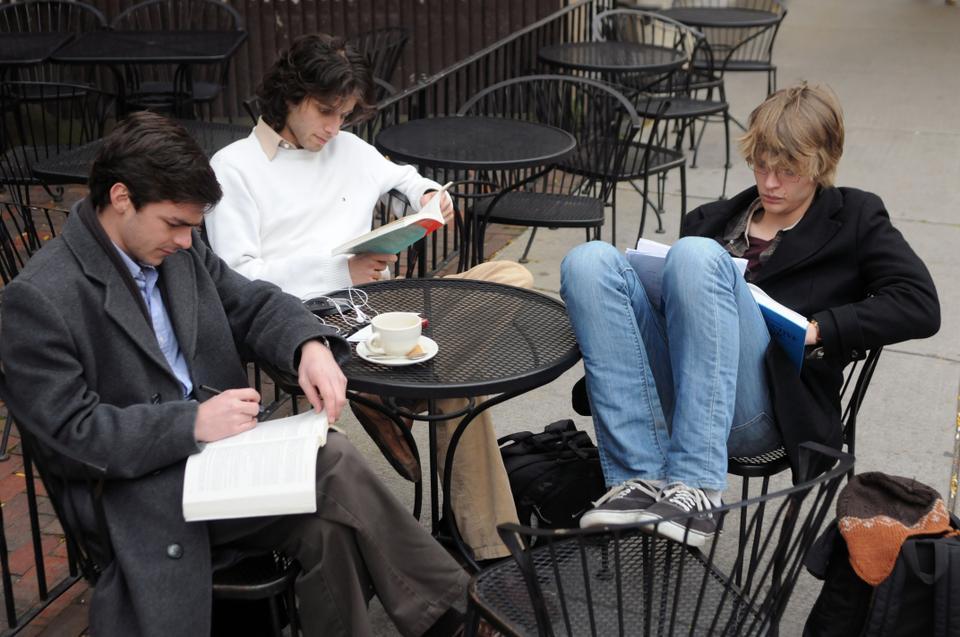
Death of the Hipster
Last week, New York Magazine published a feature entitled “What Was the Hipster?” The article, which suggests the end of the hipster era, followed a period of increased interest in defining this cultural phenomenon and the September release of the book “Stuff Hipsters Hate.” Roving Reporter went to Café Pamplona to scope out some hipsters in their natural habitat to see what they have to say about all of this attention.
Efe M. Balikcioglu, Graduate School of Arts and Sciences
Abigail F. Guyton, Bard College ’12
Roving Reporter: Would you call yourself a hipster?
Efe M. Balikcioglu: I went to Princeton as an undergraduate. One of the eating clubs was the hipster eating club. It was mainly students from the philosophy and comparative literature departments. They played contemporary, indie, and jazz music. They hosted bands from Brooklyn. I was in that club.
Abigail F. Guyton: No one really calls themselves a hipster. I’m from Georgia, and people in high school might have called me a hipster. I guess you could call me a hipster apologist. I’m sympathetic to their tastes.
RR: Do you think the term hipster is obsolete?
AFG: They certainly seem to be thriving where I go to school. I don’t see an end to that subculture.
RR: What’s the top thing hipster’s hate?
AFG: Sincerity. They have to do everything with irony. They’re afraid to embrace anything.
RR: Are hipsters misunderstood?
AFG: I don’t know. There was an article a few years ago that said that hipsters are a sign of the death of Western Civilization. I wouldn’t give them that much power. They’re far more innocuous than most people think.
RR: Do you notice a lot of hipsters around Harvard?
AFG: I’m struck by a lack of hipsters walking around. There’s an Urban Outfitters and an American Apparel, so there have to be some hipsters [editor’s note: RR went to American Apparel to scout out the hipsters. They just found too many people trying to buy slutty Halloween costumes].
RR: So do real hipsters actually shop at Urban Outfitters?
AFG: Hipsters shop there, but they say they don’t.
EMB: It’s too commercial.
Julian K. Arni, ’11
David Zuluaga ’12
William “Bill” A. Kowalsky, Jr. ’12
All smoking hand-rolled cigarettes, all philosophy concentrators.
RR: How often do you come here?
All: Everyday.
RR: What are you reading?
William “Bill” A. Kowalsky: I don’t want to be put down as having been reading “Deductive Logic.” Put down Murakami—a hipster favorite.
Julian K. Arni: “Theory of Reason Under Uncertainty.” It’s a self-help book.
David Zuluaga: Aristotle’s “Nicomachean Ethics.” Also a self-help book.
RR: Are these for class or for pleasure?
DZ: Both.
RR: Would you say that you’re a hipster?
DZ: I’m from Colombia. That category doesn’t exist there.
WAK: I wouldn’t identify. I’m not a hipster. I’m a stoner.
JKA: I would say that he [WAK] is a hipster.
WAK: Tu quoque [Latin for “you too”] You’re a fucking hipster.
RR: Are you sure you want that printed?
WAK: Print it
RR: Where do Harvard hipsters congregate?
DZ: The Advocate, WHRB.
RR: What do hipsters hate most?
JKA: Group hikes?
WAK: Bros—the universal enemy of the hipster.
DZ: That’s true.
WAK: That question stretches my imagination.
RR: What would the death of the hipster entail?
WAK: The death of the hipster is when hipsterism becomes the norm. That’s some deep shit there.
RR: Would you say that the hipster is dead?
JKA: I live in Central Square. I don’t think so.
WAK: It seems like it’s just picking up steam.
Christopher E. Link,
Server at Café Pamplona
RR: Would you classify some of the people that come here as hipster?
Christopher E. Link: Yeah, definitely
RR: And how would you define a hipster?
CEL: To tell you the truth, I don’t know the difference between hipster, indie, et cetera.
RR: Would you say that the hipster as a subculture is dying down?
CEL: I wouldn’t say it’s dying down. When it first started, the classification was more defined. It’s a much broader category now. One hipster might look different from another, but they’d both be considered hipsters. The fact that there’s still videos and websites making fun of hipsters shows that they still exist.
Saúl Roll, Regular at Café Pamplona
RR: Would you say that the era of the hipster is coming to an end?
Saúl Roll: The average lifespan of a fad is a few years. After that, there will always be a residual group who keep up the movement. At this point, you still have some residuals. In fact, there will be a residual group until they all die out. Take the example of the hippies: you can still see some around the Square.
RR: So would you compare the hipsters to the hippies?
SR: The hippies were the last time a fad had such a big effect. But the hipsters aren’t trying to change anything. They’re just a group with certain external characteristics. They’re the latest in a history of groups that like to think they’re the cool ones in the generation.
Yi Jean Chow ’12
RR: Is the hipster subculture still thriving?
Yi Jean Chow: Being alternative is so mainstream that it doesn’t mean anything anymore.


